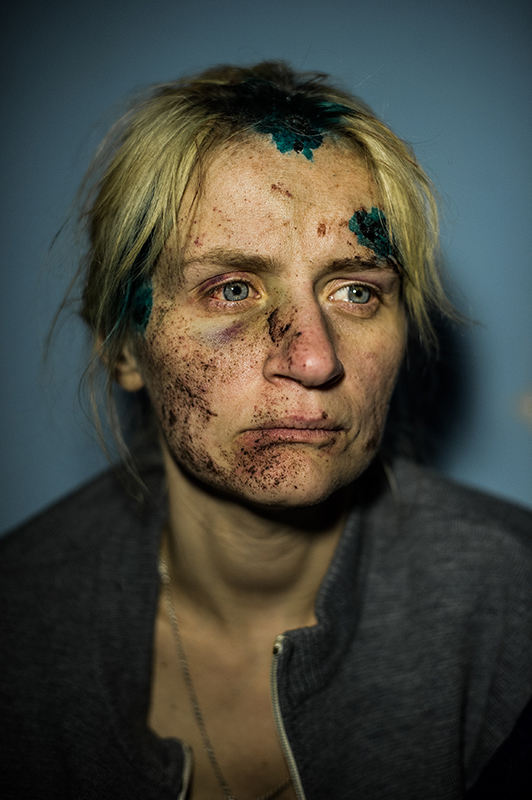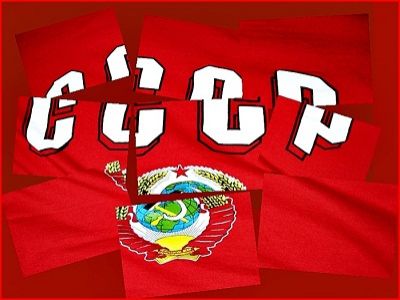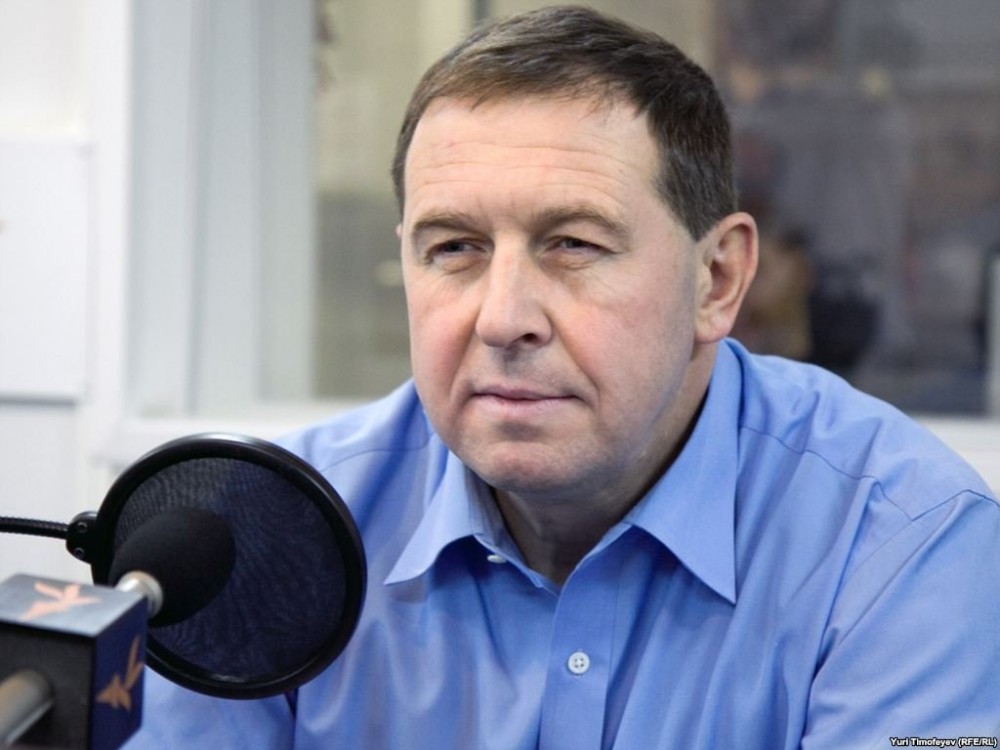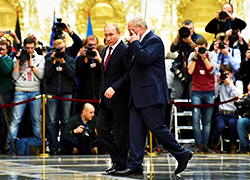This article was written in 2011 to analyze the threats which Ukraine faced. But it is even more relevant today, as many actions of the Russian-affiliated groups became clear after the start of Russian aggression in Ukraine. For instance, in 2014, the goals of Russian-aligned marginal organizations, such as the “cossack formations” which supplied manpower to the conflict Russia generated in eastern Ukraine, became clear. In 2018, this article has become even more urgent, as Russia continues to wage its hybrid war all over Europe with the help of centers such as the Alexander Gorchakov Public Diplomacy Fund, Russian center of science and culture, the Austrian-Russian Friendship Society (ORFG) etc.
What is the “Russian World”?
The “Russian World” is a flexible and well-thought-out technology for spreading the ideology of a specific group that identifies its interests and world vision with Russia’s national interests (advocates of the “Russian World” maintain that its geography stretches beyond the borders of the Russian Federation).
First of all, we’ll try to explain what these ideologists mean by the “Russian World.” Olga Batanova from the Russian Presidential Academy of National Economy and Public Administration defines the “Russian World” as:
“a global cultural and civilizational phenomenon that comprises Russia as the Motherland and the Russian Diaspora, a phenomenon that unites different peoples who, regardless of their nationality, consider themselves Russian, speak Russian, are attached to Russian culture and spiritually tied to Russia, and are not at all indifferent to Russia’s affairs and future.”
Used in this context, the term “world” does not refer only to our world as we know it today, but also to “secular life”, “personal and social space”, etc.
In his greetings on Orthodox Cossacks Day, the Patriarch Kirill of the Russian Ortodhox Church, as well as the Ukrainian Orthodox Church (Moscow Patriarchate) in Ukraine, outlined the geography of this concept, citing Russia, Ukraine, Belarus, Moldova and Kazakhstan as the rightful heirs of Holy Russia.
In his article titled Ukraine and the Russian World, A. Stavytsky writes:
“The Russian world is not against Ukraine, but for a Ukraine that is civilized, polyethnic and multicultural… therefore, it’s clear that it should be hostile to the ‘Galician’ version for Russian-Ukrainian cooperation and interaction, which says that ‘everything that’s good for Russians is bad for Ukraine and vice versa, as Ukrainian values are completely alien to the ‘Russian World”…”
Russian political analyst Piotr Shchedrovytskiy gives a clear statement about the interests of the “Russian World,” namely to increase the productivity of Russian capital (reproduction of wealth, attraction of external non-Russian capital) and create joint capital, considering and assessing all this as a structural adjustment of Russian capital.
Therefore, such an ideology logically justifies the purchase of shares of Baltic energy companies by Russia’s Gazprom, the construction of nuclear power plants in Belarus, and other practical actions aimed at creating a powerful base for the “Russian World.”
Tentacles of the “Russian World” outside Russia
The “Russian World” isn’t just a local Russian affair. The creators of the “Russian World” use the best techniques developed by years of cooperation between the Motherland and the Diaspora, the functioning of transnational corporations (Gazprom, Sberbank and Rosneft appear regularly in world financial ratings), the practice of velvet revolutions through non-governmental organizations and banal bribery of influential people (for example, Gerhard Schroeder, who is one of the main lobbyists for Nord Stream).
The following Russian institutions officially promote the “Russian World”: the Governmental Commission on Compatriots Living Abroad, the International Association of Russian Language and Literature Teachers, the Federal Agency for Affairs, the “Russian World” Foundation, and the Russian Orthodox Church (in particular, the Department for External Church Relations).
Approximate scheme to implement the “Russian World”:
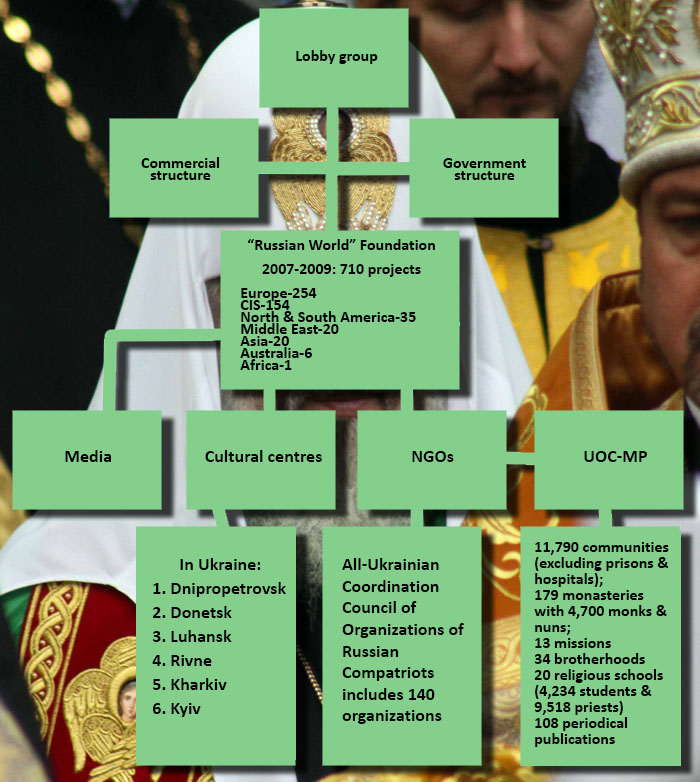
Let’s analyze the activities of the “Russian World” Foundation, one of the most active and visible tools supporting pro-Russian organizations. The official purpose of the Foundation is to spread Russian culture and support the humanities. In 2007, Vladimir Putin appointed Vyacheslav Nikonov chairman of the board, while the board of directors and the board of trustees include not only certain professors and academics, but also representatives of the Russian Orthodox Church, the Presidential Administration, the General Secretariat of the Ministry of Foreign Affairs, the general directors of large media holdings, such as VGTRK (All-Russia State Television and Radio Broadcasting Company) and ITAR-TASS. The “Russian World” Foundation is primarily a financial instrument that allows the Kremlin to legally support and finance certain projects.
The fact that the Foundation itself was launched in 2007 suggests that it’s based on the concept of funding velvet revolutions through non-governmental funds. The Foundation’s most important partner in Ukraine is the All-Ukrainian Coordination Council of Organizations of Russian Compatriots, an umbrella group including more than 140 non-governmental organizations involved in defending Russian language and culture.
The scale of the Foundation’s financing is enormous: the RF 2009 budget allocated 500 million rubles to the Foundation (approx. $9 mn), but if we take into account the participation of such structures as Russian Railways, the Russian Orthodox Church (ROC), different Russian media holdings, etc., this amount is much higher. The geography of Foundation activities is no secret: 710 projects were implemented in 2007-2010, of which 254 in Europe, 154 in the CIS countries, 35 in North and South America, 20 in the Middle East, 20 in Asia, six in Australia, and one in Africa.
The ROC, and in particular its representative office in Ukraine, the Ukrainian Orthodox Church (Moscow Patriarchate; UOC-MP) is a powerful organization that functions with both human and financial resources, and has access to both national and regional politicians and businessmen. To date, the UOC-MP has 11,790 communities (excluding prisons and hospitals), 179 monasteries with about 4,700 monks and nuns, 13 missions, 34 brotherhoods, 20 religious schools, where more than 4,000 students study every year, and about 9,518 priests, as well as 108 periodical publications. If we add up all the other Russian NGOs, we see a very wide range of activities that are not based on just historical or cultural themes.
Russian business
If we look at the oil refining industry, we can clearly see how Russian business has penetrated Ukraine on a fully legal basis. The Kremenchuh oil refinery with a capacity of 18.6 million tons of oil annually was redeemed by Tatneft in 1994; the Lysychansk refinery (16 million tons/year) was transferred to the Russian TNK Company in 2000; the Odesa refinery (3.6 million tons/year) was redeemed by Russia’s Lukoil in 1999, and the Kherson refinery (8.7 million tons/year) by Russia’s Alians Oil Company in 2000. It’s very clear how modern practices of corporate development help to realize national interests.
Russian diaspora
The term “Russian World logistics” is used to describe the operations and activities aimed at the Russian Diaspora. It functions through a network of governmental, community and charitable institutions. The Russian government has formulated a legal definition for “compatriots living abroad,” which is enshrined in Federal Law No.99-ФЗ dated May 24, 1999 “On State Policy of the Russian Federation in Relation to Compatriots Living Abroad.”
In 2007-2008, the Government Commission for Compatriots Living Abroad conducted studies and published a collection on the history of the Russian Diaspora in Kazakhstan, Uzbekistan, Türkiye, Slovakia, Denmark, Germany, and the Baltic and Scandinavian countries; the political activities of Russian Diasporas in the EU, the USA and CIS countries are also regularly monitored. In addition to studying the current situation in Russian Diaspora communities, the Commission supports and publishes journals thanks to the state budget and private sponsors; distance learning courses in Russian are organized and Internet communication is encouraged on Russian portals. Russian NGOs provide legal support and help create Russian centres in many countries (“Russian World” centres provide materials about Russia, and thus allow access to authorized representatives).
Through such “innocent cultural” activities, the Foundation clearly organizes and monitors relations and work with the Diaspora, and encourages further actions aimed at establishing contacts with political and business circles of foreign countries and increasing the influence of certain diaspora members. For example, a former KGB agent at the Foreign Intelligence Department, Aleksandr Lebedev, until recently a deputy of the State Duma, is currently the owner of several British magazines run by the Independent Evening Standard.
The “Russian World” is a technological concept that fits the demands of our day and age and brings together Russian politicians, cultural figures and commercial structures; it has vast experience in building transnational business companies and establishing a geopolitical hegemony for “metaphysical” and religious amateurs, as well as for adherents of clear, analytically sound business decisions. The “Russian World” uses all available methods, acting not only at the government level, but also at the media, education, civic engagement and entrepreneurship level.
The answer to the “Russian World” cannot be found in vain and awkward attempts to talk louder and outshout Russia’s political clowns, but to respond adequately at all levels of social life.
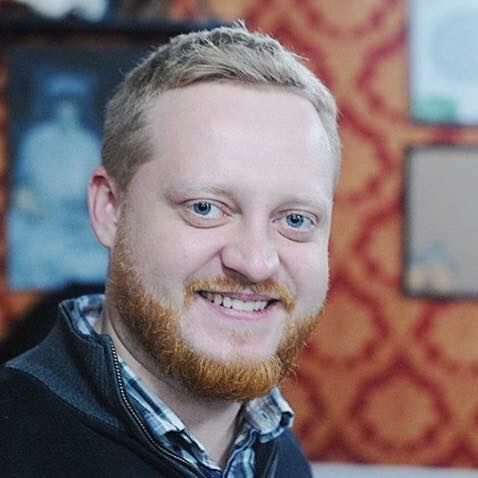
Read also:
- Putin’s Russian world seeks to offer others 12 unattractive values, Sytin says
- Putin’s Russian world increasingly informed by a Nazi aesthetic, Moscow specialist says
- From “Russian world” supporter to Ukrainian patriot: a story of a Donbas girl’s worldview transformation
- Middle Volga Muslim fighters for ‘Russian world’ in Donbas divided on its meaning, Suleymanov says
- Incredibly shrinking: Putin’s ‘Russian world’ in the post-Soviet space
- Photo essence of Putin’s “Russian world” in the Donbas


